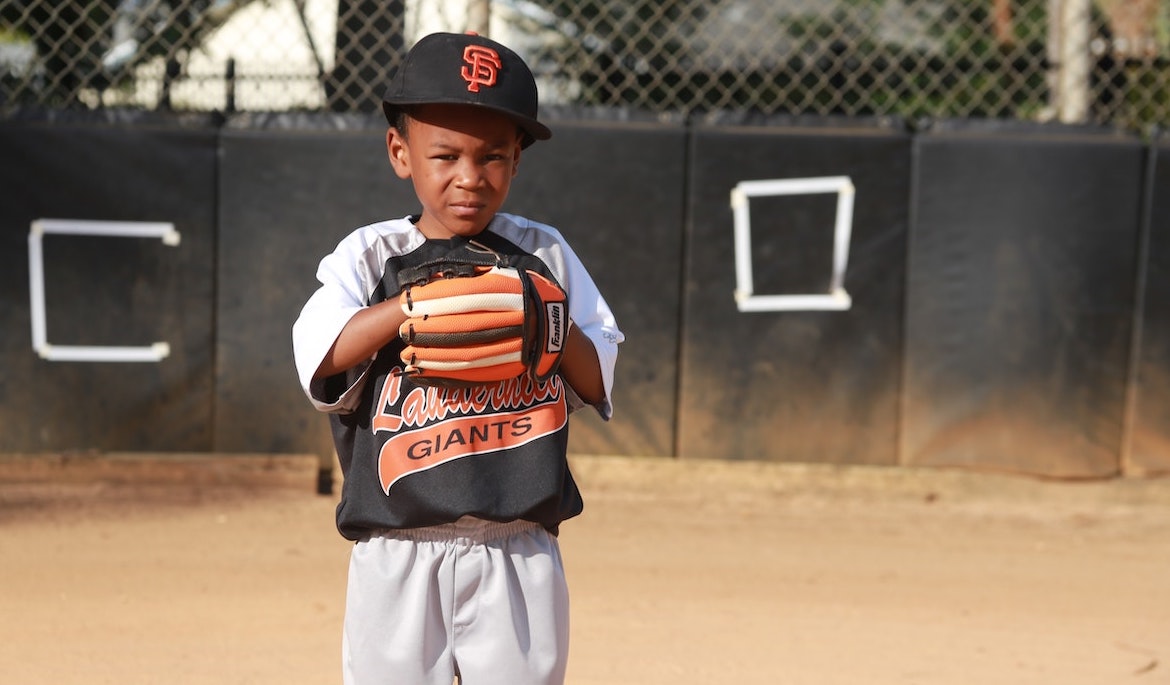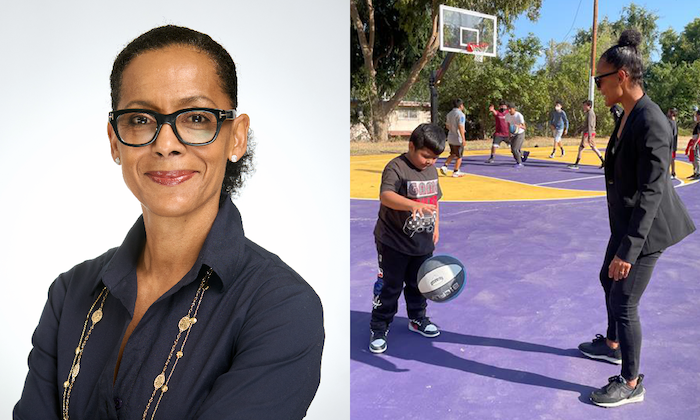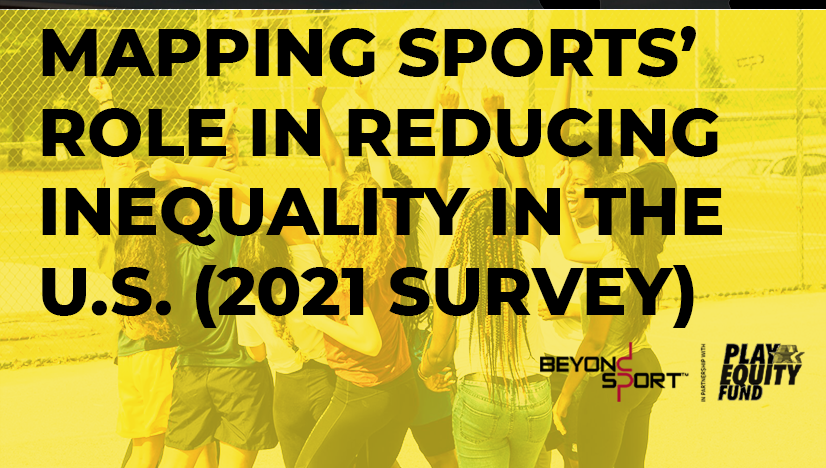
#Return2Play Fund in Focus: Our Q&A with Renata Simril
February 10, 2023
In recognition of February's celebration of Black History Month in the US and the recent release of the Return to Play Fund PSA produced by our founding partner, ESPN, and its accompanying resources, this month we are speaking with members of our Return to Play Fund Expert Advisory Council. Spanning diversity, equity and inclusion, public health and youth sports, members shared their insights and expertise as we developed the Fund to help ensure that Black and Brown youth in the US are not further disadvantaged as we emerge from the COVID pandemic.
Today, we’re featuring Renata Simril, President and CEO of the LA84 Foundation and President of the Play Equity Fund. Among many other areas, Renata is an expert on diversity, equity, inclusion and access. Serving Southern California youth, she has elevated the LA84 Foundation into a national leader in the role that sports have in positive youth development. The Play Equity Fund was founded by the LA84 Foundation in 2014 as its charitable partner, focused nationally on play equity as a social justice issue.
Renata spoke to us about play equity, shifting norms, what sports entities can do to help achieve an equitable return to play and more:

The theme for this year’s Black History Month is Black Resistance, "highlighting how Black Americans have fought against racial inequality." Can you share how you have been working to address play equity – removing barriers so that all kids have access to sport and play?
While that is a thought-provoking way to frame the question, by asking “fighting against?” I would suggest we aren’t fighting against anything. Our work specifically is about fighting for equality in sports and play.
We are fighting for this opportunity for all kids – regardless of their zip code, gender, economic status, religion or ability. The play equity gap is what we’ve defined as the gap between those who have equitable access to sport and play – and the millions of kids who are forced to live without it. If we think of this gap as a measure of unrealized potential because of a lack of opportunity, then we realize the benefits that sport and play have on healthy childhood development.
Broadly, this includes physical and mental wellness, social and emotional development, a child’s connections to academics and development of life skills. Which yes, benefits the individual, but also benefits our society. It must be supported and it must be something that we all fight for together.
But the playing field is not level for all children. Our work is focused on leveraging our platforms and those of our partners to re-center play and sport as an essential element of childhood well-being and as a pathway to success. We work with our partners to educate and advocate for policy changes at the local, state and federal levels to remove barriers and open access to sport and play in poor, communities of color, and we raise funding to help more kids play. Our work is about giving all kids the opportunities they deserve. Because the transformative power of sport and play is lost when it’s only available to the privileged.
Why do the LA84 Foundation and the Play Equity Fund believe that ‘play equity’ is a social justice issue’?
Because the data and research say it is. Millions of youth live in poverty, public schools have defunded enrichment programs – including sports – and many public schools have Physical Education as an unfunded mandate for 1-2 days per week.
Kids of color are 2x more likely to live in areas with subpar park space and have an obesity rate 2x higher than affluent kids, and 80% of young people do not meet the federal guidelines for physical activity. Black and Latinx youth have the highest rates of stress, anxiety and depression.
There is also a wealth of national research indicating that participating in sport and play provides a framework for brighter, healthier futures for children. That demands equitable access. Our own research – including the biennial youth sports survey in Los Angeles County – shows that kids from affluent families participate in sports at higher percentages. Many CEOs and leaders credit a background in sports as a springboard to future success and lifelong well-being. If children are excluded from opportunities to play based on their family’s income, where they live or their socioeconomic standing, then play equity by definition is a social justice issue.

Why is it important for the Play Equity Fund to employ a public awareness approach and focus on education to help increase youth sports and play opportunities?
We believe that data, evidence-based research and storytelling can shift norms, so that sports, play and movement are valued for their social benefits and are seen as an antidote to what ails our society. Shifting norms can influence how youth sports and play are delivered and resourced; what’s demanded, what’s supplied and what’s funded.
Imagine our world if all kids had access to the benefits of sports and play as a pathway to well-being. I believe in life we are all striving for a state of well-being: that sense of health and vitality that arises from positive thoughts, emotions, actions, and expressions. When we have well-being, we feel happy, healthy, socially connected, and purposeful most of the time. Physical activity, whether it be sports, play or movement is a path to this sense of well-being.
In your opinion, what are the top barriers to sport and physical activity for Black and Brown youth in the US?
We often hear about lack of park space, family income, transportation and many other ‘symptomatic’ barriers to physical activity. These are all, in fact, barriers. However, I would suggest the greatest barrier to sports and physical activity is that more often than not, school districts, principals, administrators and policymakers are not prioritizing sport, play and movement. Nor are they funding these activities where they are needed most – and if they are, it’s not being done to scale.
What are the key steps sports entities should take to help achieve an equitable return to play?
Don’t recreate the wheel. The problem we are facing in this crisis is far too big for any single sports entity, team, brand or foundation to solve alone. We should be working in partnership, lifting up regional collaborations and backbone organizations who are supporting grassroots, community-based organizations that are on the ground and doing the work to scale collective impact.
Organizations such as the Play Equity Fund in Southern California, the King County Play Equity Coalition in Seattle, Laureus Sport for Good in Chicago or the Philadelphia Youth Sport Collaborative, just to name a few. We should focus on both the urgent – the needs of our youth today – and the important, which is addressing and removing systematic barriers and poor policies preventing access in the first place. We should all be working together to create a collective movement focused on expanding opportunities and increasing public and private resources for our most vulnerable youth.
What is it about sport and its critical role in communities that can help with systemic issues like structural racism or social injustice?
I believe there is a cost to society when millions of young people don’t have the opportunity to play. At the highest level, it is always wrong when access determines whether kids experience an enriched life or not. Having kids participate in sports or play is certainly part of an enriched life, not just for them, but it adds depth to the lives of parents, as well as value to communities.
Sport brings people together. It helps create the conditions for kids to thrive by building positive affiliation and connection to their school. It provides an adult advocate in young lives in the form of a coach, and sport encourages agency – that connection between effort and success – which builds grit and resiliency.
Sport improves physical health, develops social-emotional skills, improves school attendance and enriches academic readiness. Additionally, coming out of the Covid pandemic we’ve seen a marked increase in mental health issues, especially in young people. We have a watershed moment to unlock the promise of sport, play and movement to improve our mental wellness and to put youth on a path to lifelong well-being. Let’s not waste the opportunity.
Learn more about the Return to Play Fund and how you can get involved. Parents and guardians, young people and coaches and youth sport providers, please take advantage of the Return to Play Funds free digital resources - provided by Council members and other trusted sources - to help navigate a healthy and equitable return to play.